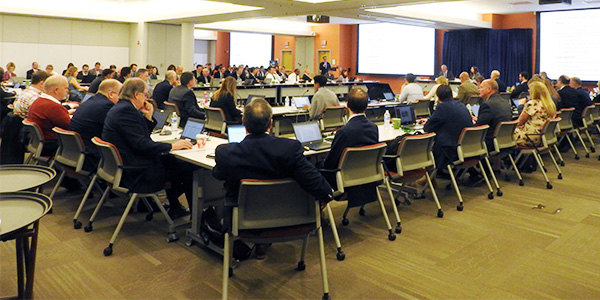Denise Foster Takes over as MRC Chair

VALLEY FORGE, Pa. — Denise Foster, PJM’s vice president of state and members services, chaired her first Markets and Reliability Committee meeting on Thursday, replacing retired CFO Suzanne Daugherty.
Foster came to PJM not once, but twice throughout her two-decade career as an attorney and consumer advocate: first in 2000 as counsel and regulatory affairs manager, and again in 2009 as her current role managing members services, a position that has evolved as PJM’s membership has swelled.
Foster prides herself on building relationships and encouraging positive discourse. “I want to ensure that everyone’s voice is heard, and that the information needed is presented and discussed so good decisions may be made,” she said in a PJM press release April 23. “We are first, people, and second, business representatives.”
Load Interests Block FTR Rule Changes
The Electric Distributor and End-Use Customer sectors blocked a proposed revision to PJM’s rules about when financial transmission rights profits should be forfeited.
All but one of the voting members in both sectors rejected the joint plan developed by Exelon, NextEra Energy and VECO Power Trading and approved by stakeholders at the Market Implementation Committee in November. The proposal would replace the RTO’s existing “penny test” for a threshold of FTR flows of 10% or more across a constraint.
“Stakeholders like Exelon have stopped participating both in virtual activity and FTR markets [at the same time] because existing rules are over burdensome,” said Sharon Midgley, director of wholesale market development for Exelon. “The current FTR forfeiture rule is too restrictive for competitive suppliers, prevents legitimate business activities and increases costs to customers.”
“We’re a large load-serving entity,” Exelon’s Jason Barker added. “This is increasing risk premiums. It’s another example of over-mitigation in PJM’s markets.”
Stakeholders deferred a vote on the plan at the December MRC after some expressed fear it could unintentionally create exploitable market loopholes. (See “FTR Forfeiture Rule Deferred,” PJM MRC/MC Briefs: Dec. 20. 2019.)
The Independent Market Monitor also expressed reservations about changing the status quo. It has argued that the penny test is better at catching manipulative behavior. (See “FTR Forfeiture Proposal Endorsed,” PJM MIC Briefs: Nov. 7, 2018.)
A second FTR rule change that would adjust calculations to account for on-peak and off-peak FTRs was endorsed by acclimation. (See “First Read on Change to FTR Forfeiture Calculations,” PJM MIC Briefs: March 6, 2019.)
Carbon Pricing Talks Move Forward
PJM will soon assemble a task force dedicated to studying the impacts of carbon pricing throughout the RTO’s 13-state footprint.
Stakeholders approved the problem statement and issue charge in a sector-weighted vote of 3.92 to 1.08 on Thursday. The new group will report findings to the MRC over the next 18 months.
“I think it’s important to get the ball rolling, but this isn’t a fast-track item,” said Michael Borgatti of Gabel Associates.
Borgatti presented a first read of the problem statement and issue charge at the March 21 MRC that would task stakeholders with creating rules to address carbon leakage and help states meet greenhouse gas reduction policies. Borgatti made the presentation on behalf of the Independent Energy Producers of New Jersey, which includes NextEra and PSEG Power.
Dana Horton, of American Electric Power, and Chuck Dugan, of East Kentucky Power Cooperative, two utilities with substantial coal-fired generation, opposed the initiative.
“If we were talking about a nationwide carbon adder, we’d be all in,” said Horton, who said he feared the initiative could lead to higher prices for AEP customers in states that have not joined Illinois and New Jersey in approving nuclear subsidies. “But we disagree that this is the right time to do this.”
Dugan echoed Horton’s sentiments. “We’re a state that’s a coal state,” he said. A carbon adder “is not required, and we are very busy in the stakeholder process [with other issues]. We should hold off.”
Marji Philips of Direct Energy, however, said Borgatti’s proposal is the “best solution to deal with externalities that the states say PJM is not dealing with.”
“Ohio’s going to have a [zero-emission credit] program soon if their utilities have their way,” she added, referring to legislation under debate in the state legislature.
RTEP Removal Language Vote Deferred, Again
After a bit of procedural skirmishing, members agreed to delay a vote on LS Power’s proposal to amend Manual 14B for another 60 days while stakeholders continue talks about the intersection of supplemental and regional project planning.
Sharon Segner, vice president of LS Power, offered the revisions at the January MRC after expressing concern over the growing number of supplemental projects languishing in the Regional Transmission Expansion Plan. Supplemental projects are proposed by TOs and are not required for compliance with PJM’s reliability, operational performance or economic criteria.
Segner’s proposed language specifies that a transmission owner’s supplemental project “will generally be removed from the RTEP” following a final order by a state siting agency rejecting the project. A special session of the Planning Committee has been meeting over the last 60 days to review a variety of legal issues related to FERC Orders 890 and 1000 — meetings that PJM staff said are narrowing their differences. (See “LS Power will Seek 2nd Deferral on Transmission Replacement Language,” PJM PC/TEAC Briefs: April 11, 2019.)
When Segner presented specific topics for the special PC session to discuss during the deferral period — including possible Operating Agreement revisions — Chair Foster intervened.
“Adding all these items to the discussion that has been assigned to the lower committee is out of order,” she said. “The expansion [into OA revisions] is what I particularly take issue with.”
Segner argued against Foster’s interpretation of committee rules, noting that any revisions to rules relating to Order 1000 need inclusion in the OA, per FERC precedent. After nearly an hour of debate with other stakeholders about the appropriate scope of the motion, she agreed to proceed with only the 60-day deferral.
“I request in the minutes for today it is specifically outlined that in 60 days, when this issue comes back before the MRC, if a friendly amendment that reflects OA language that is germane to the main motion is offered, I may deem it as friendly,” Segner said.
– Christen Smith






